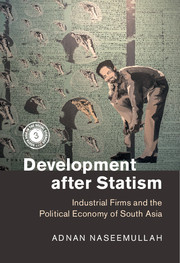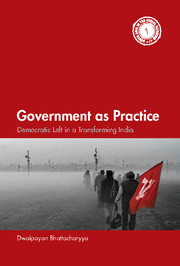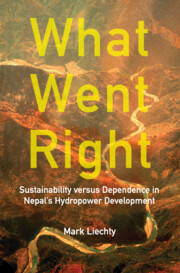Development after Statism
How can industrial production be managed without the guidance of the state? Adnan Naseemullah discusses industrial development in a new era of drastically constricted state capacity, from the perspective of the manufacturing firm. India's manufacturing economy has been growing after state promotion has receded. How, then, does Indian manufacturing develop in this context? Naseemullah argues that Indian firms must create production structures themselves, investing in networks of capital and labor without signals from above. Depending on manufacturers' backgrounds, these relationships are based either on formal rules or through personal ties, creating a patchwork of institutions that crosscut region and sector. As a result, many firms have been able to regain some certainty for investment, but at the cost of national coherence and the possibility of broader transformation. As a mirror case, this book also explores Pakistan's industrial trajectories, in which similar dynamics suggest the broader applicability of this framework.
- Utilizes in-depth field research in both India and Pakistan
- Integrates both interview-based ethnographic data and quantitative analysis
Reviews & endorsements
'In a political economy framework, no one has probed firm-level manufacturing data in India and Pakistan more meticulously than Adnan Naseemullah. For that reason alone, let alone others, this book stands out and is worth reading.' Ashutosh Varshney, Brown University, Rhode Island
'Deftly combining statistical with ethnographic sources, Adnan Naseemullah has given us a rare comparative view of the merging relations between government and business in India and Pakistan. Should be of interest to scholars, policymakers and commentators.' Partha Chatterjee, Columbia University, New York
'What is the institutional architecture of industrial development in the aftermath of the decline of the state-led industrial development model? Based on a careful analysis of industrialization in India and Pakistan, Adnan Naseemullah provides an original and compelling analysis that puts firms and industrialists as key governance actors shaping the institutional politics of the industrial economy in South Asia and beyond.' Devesh Kapur, University of Pennsylvania
Product details
December 2016Hardback
9781107158634
350 pages
238 × 160 × 25 mm
0.66kg
15 b/w illus. 15 tables
Available
Table of Contents
- 1. Introduction
- 2. Theoretical framework
- 3. The rise and fall of India's Statist development
- 4. Industrial finance after Statism in India
- 5. Labor management after Statism in India
- 6. Indian firms and the international economy
- 7. The rise and fall of Pakistan's Statist development
- 8. Industrialization after Statism in Pakistan
- 9. Conclusion
- Appendix 1. Statistical models
- Appendix 2. List of interviews
- References
- Index.








